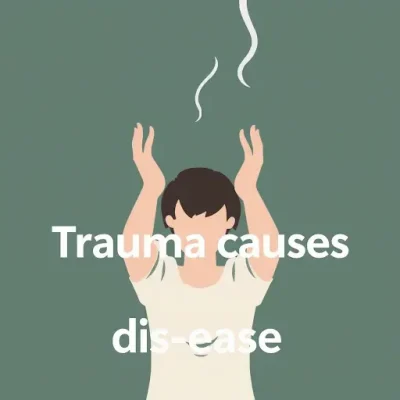Blog
How Unprocessed Trauma Leads to Dis-Ease and What You Can Do About It

Introduction:
Unprocessed trauma doesn’t just affect our emotional and mental well-being—it can also manifest as physical dis-ease. Dis-ease, a term describing discomfort or illness stemming from unresolved emotional or psychological issues, often reveals itself through various health problems. Understanding how unprocessed trauma contributes to dis-ease is crucial for finding effective ways to heal and restore balance.
How Unprocessed Trauma Contributes to Dis-Ease:
-
Chronic Stress Response:
- Continuous Activation: Unresolved trauma keeps the body’s stress response system constantly activated. Research shows that chronic stress, often stemming from unresolved trauma, is linked to cardiovascular issues (JAMA Network Open, 2021). This ongoing stress can lead to serious physical health problems, including heart disease, digestive issues, and a weakened immune system.
-
Immune System Impact:
- Weakened Immunity: Persistent stress associated with unprocessed trauma impairs the immune system, increasing susceptibility to infections and illnesses (Frontiers in Psychology, 2015). The body’s natural defense mechanisms are compromised, making it more challenging to maintain health.
-
Inflammation:
- Increased Inflammation: Trauma can contribute to chronic inflammation in the body. Studies have shown that unresolved trauma and stress are linked to systemic inflammation, which is associated with many chronic health conditions, such as autoimmune diseases and arthritis (Nature Reviews Immunology, 2017).
-
Muscle Tension and Pain:
- Physical Manifestations: The physical manifestation of unprocessed trauma often includes muscle tension and chronic pain. Research in The Journal of Bodywork and Movement Therapies (2018) examines how trauma and stress can lead to persistent discomfort and muscle tension.
-
Psychosomatic Symptoms:
- Mind-Body Connection: Emotional distress from unresolved trauma can manifest as psychosomatic symptoms, such as headaches, gastrointestinal problems, and fatigue, often without a clear medical cause (Psychosomatic Medicine and Psychosomatic Research, 2016). The mind-body connection plays a significant role in these symptoms.
-
Mental Health Issues:
- Emotional Distress: Trauma can result in mental health challenges like anxiety, depression, and PTSD. Research published in Current Opinion in Psychiatry (2016) highlights the correlation between trauma and various mental health issues, and how these can further contribute to physical dis-ease.
-
Disrupted Sleep Patterns:
- Sleep Disturbances: Trauma frequently affects sleep quality, leading to insomnia or disturbed sleep patterns. Poor sleep exacerbates physical health issues and increases stress levels (Sleep Medicine Reviews, 2017).
-
Altered Behavioral Patterns:
- Self-Care Neglect: Individuals with unresolved trauma may engage in harmful behaviors such as poor diet, substance abuse, or lack of exercise. The study “Behavioral Changes Associated with Trauma and Stress” (Psychological Trauma: Theory, Research, Practice, and Policy, 2015) examines how trauma can lead to self-care neglect and unhealthy behaviors.
-
Emotional Dysregulation:
- Difficulty Managing Emotions: Trauma can impair emotional regulation, leading to heightened emotional responses and mood swings. Research published in Clinical Psychology Review (2018) discusses how trauma affects emotional regulation and its impact on physical health.
-
Low Self-Esteem and Self-Worth:
- Negative Self-Perception: Unprocessed trauma can lead to issues with self-esteem and self-worth. The study “Self-Esteem and Trauma: The Impact of Self-Worth on Recovery” (Journal of Trauma & Dissociation, 2018) explores how unresolved trauma affects self-esteem and self-worth, influencing overall health.
What You Can Do About It:
- Seek Professional Help:
- Engage with Experts: Work with therapists or counselors specializing in trauma to process and address emotional wounds effectively.
- Practice Mindfulness and Relaxation Techniques:
- Incorporate Healing Practices: Techniques such as meditation, yoga, and deep breathing can help manage stress and promote emotional healing.
- Adopt Healthy Lifestyle Habits:
- Support Overall Health: Focus on a balanced diet, regular exercise, and adequate sleep to support physical and emotional resilience.
- Explore Somatic Therapies:
- Body-Mind Connection: Consider therapies like Introspective Breathwork® to release stored trauma and alleviate physical symptoms.
Conclusion:
Unprocessed trauma can lead to various forms of dis-ease, affecting both physical and emotional health. By understanding this connection and taking proactive steps to address unresolved trauma, you can support your journey toward healing and well-being.
If you found this post helpful, please share it with others who might benefit. Remember, healing is a journey, and support is available every step of the way.
